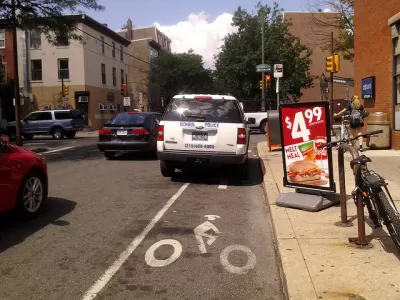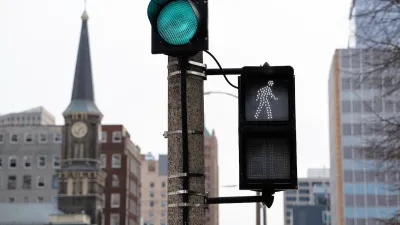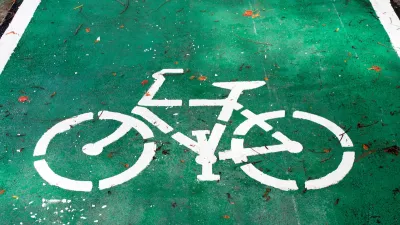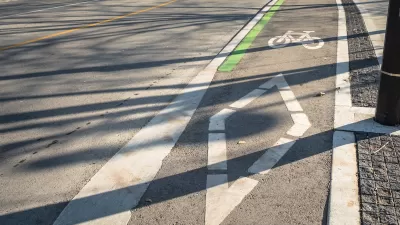Recent proposals that would reward citizens for reporting bike lane violations could further damage social cohesion and create a ‘narc economy.’

In an opinion piece for Streetsblog NYC, MJ Barnett cautions against ‘narc urbanism,’ the emerging trend of new laws that essentially put a bounty on reporting illegal behavior such as blocking a bike lane.
In New York City, a proposed law would let residents earn a percentage of citation revenue if they report a blocked bike lane, a proposal similar to an existing law that created a similar program for reporting idling trucks to prevent air pollution.
For Barnett, this ‘citizen-led surveillance’ is not the solution.
American society is already fractious enough: interpersonal trust is sharply deteriorating as real-world social networks decline, and rising distrust in our institutions and media make consensus increasingly challenging. Bills like Intro 501 further the trend toward mutual mistrust, hardening existing us-versus-them dynamics in our shared public spaces by creating a narc economy with serious financial incentives and penalties.
Such laws, Barnett argues, are a perversion of Jane Jacobs’ ‘eyes on the street’ concept, turning mutual protection into vigilante justice. Additionally, “Deputizing citizens to address traffic violations also implicates the many ethical issues attendant to privatized and citizen-led law enforcement,” pointing to America’s “long history of errant and racially biased community policing.”
As Barnett points out, blocking a bike lane is already illegal. Laws like Intro 501 allows the NYPD to shirk its duties and pass off responsibility to ordinary citizens rather than address the root problem. To solve urban problems, Barnett argues, “we’re going to need leaders willing to leverage the power of the state to do what’s right, even when it’s difficult.”
FULL STORY: Opinion: Here’s Why I am Against ‘Narc Urbanism’

Manufactured Crisis: Losing the Nation’s Largest Source of Unsubsidized Affordable Housing
Manufactured housing communities have long been an affordable housing option for millions of people living in the U.S., but that affordability is disappearing rapidly. How did we get here?

Americans May Be Stuck — But Why?
Americans are moving a lot less than they once did, and that is a problem. While Yoni Applebaum, in his highly-publicized article Stuck, gets the reasons badly wrong, it's still important to ask: why are we moving so much less than before?

Using Old Oil and Gas Wells for Green Energy Storage
Penn State researchers have found that repurposing abandoned oil and gas wells for geothermal-assisted compressed-air energy storage can boost efficiency, reduce environmental risks, and support clean energy and job transitions.

San Antonio Remains Affordable as City Grows
The city’s active efforts to keep housing costs down through housing reforms and coordinated efforts among city agencies and developers have kept it one of the most affordable in the nation despite its rapid population growth.

What Forest Service Cuts Mean for Cities
U.S. Forest Service employees work on projects that have impacts far beyond remote, rural wilderness areas.

North Texas Transit Leaders Tout Benefits of TOD for Growing Region
At a summit focused on transit-oriented development, policymakers discussed how North Texas’ expanded light rail system can serve as a tool for economic growth.
Urban Design for Planners 1: Software Tools
This six-course series explores essential urban design concepts using open source software and equips planners with the tools they need to participate fully in the urban design process.
Planning for Universal Design
Learn the tools for implementing Universal Design in planning regulations.
Heyer Gruel & Associates PA
City of Moreno Valley
Institute for Housing and Urban Development Studies (IHS)
City of Grandview
Harvard GSD Executive Education
Salt Lake City
NYU Wagner Graduate School of Public Service
City of Cambridge, Maryland





























